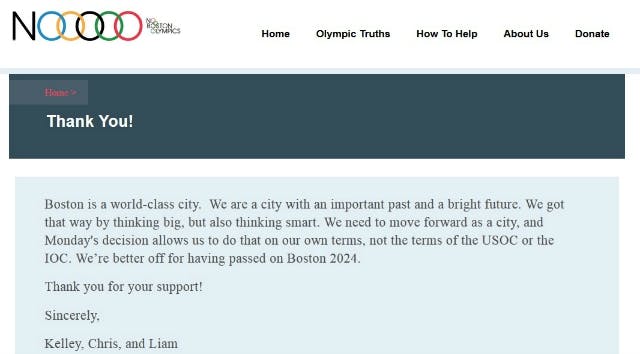When former IOC president Juan Antonio Samaranch stepped to the microphone on Sept. 18, 1990 and declared these words, “The International Olympic Committee has awarded the 1996 Olympic Games to the city of Atlanta,” the city’s residents exploded with joy, as the crowd that had gathered downtown went ballistic. Men in suits jumped in jubilation. Fireworks exploded overhead. Flags waved furiously.
I remember that day well. I watched the announcement at home with my family before I caught my bus to school—we had an impromptu early-morning party in my living room—and before classes started, the front office replayed Samaranch’s declaration on the PA system. Everybody in homeroom went wild all over again.
We were giddy with anticipation.
On Monday, Boston experienced that same joy—but for slightly different reasons than those of us who lived in Atlanta in 1990. Instead of the eagerness of hosting the Games, Boston was giddy that it wouldn’t host in 2024. Instead of knowing they could revitalize the city with this international event, like we believed 25 years ago in Atlanta, Bay Staters got to gush that the Olympics won’t ultimately cripple Boston.
With key help from outlets like NoBostonOlympics.org, the No Boston 2024 Facebook page, and the #NoBoston2024 hashtag, the city stepped up to the microphone on Monday and passed on hosting. It was absolutely the right decision.
In the span of less than three decades, we’ve gone from this elation …
… to this relief.
What happened?
Much of it had to do with the collective will of the city’s residents. Atlanta needed the Olympics to crown itself as an international city and not some southern, backwoods hamlet that much of this country erroneously believed it to be—heck, most people outside the U.S. hadn’t even heard of Atlanta before Samaranch’s announcement. Boston doesn’t need that validation, especially at the expense of its taxpayers or the city’s long-term health.
That’s what Monday’s announcement was all about. It was an issue of public financing, and the majority of the citizens weren’t ready to believe that, despite the claims of the city’s Olympic organizing committee, they wouldn’t have to dig into their own pockets for the right to host.
Boston 2024, the group tasked with securing a bid to present to the U.S. Olympic Committee (and eventually, the IOC), had argued that corporate donations, ticket sales, and a variety of other fees would provide the money to hold the Olympics. It would cost the taxpayers nothing, the group said. But a poll taken by the Boston Globe showed that 89 percent of the city residents simply didn’t buy those claims. It took Montreal, which hosted the 1976 Summer Olympics, nearly 30 years to pay off its $2.7 billion debt.
Though Boston mayor Martin J. Walsh had been a supporter of an Olympic bid, he changed his mind Monday during a press conference in which he said he wasn’t willing to mortgage his city’s future for the glamour and glitz of the Olympics. It’s the right move for Boston, and it’s the right move for most cities.
It took Montreal, which hosted the 1976 Summer Olympics, nearly 30 years to pay off its $2.7 billion debt.
We’ve seen the trend in the past few decades of cities using public tax funds in order to finance new stadiums for professional sports teams. Sports on Earth’s Patrick Hruby once called it “sports welfare.“ As Deadspin noted in 2012, of the 186 stadiums built between 1909-2012 for MLB, NBA, NFL, and NHL teams, taxpayers paid for $32.2 billion (or 61 percent) of the total $53 billion they cost to erect.
About half of that public financing occurred between 1991 and 2004, and that doesn’t even include the $1.1 billion that will be spent on the new Minnesota Vikings stadium, about half of which will be financed by Minnesotans.
Even worse, the Atlanta Braves are leaving behind the stadium that was built for the 1996 Olympics to move to suburban Cobb County in 2017. The local taxpayers weren’t even consulted about the project, even though that very same Cobb County has had to “[force] five days of unpaid furlough on its teachers” and cut some of their workforce, according to Jay Bookman of the Atlanta Constitution-Journal.
Usually, that public taxpayer money results in private profits for the teams, though arguably, there a few success stories.
@joshkatzowitz I think the people of Memphis would argue Memphis. The result is a relevant NBA franchise that’s helped revitalize downtown.
— Gary Parrish (@GaryParrishCBS) July 28, 2015
@joshkatzowitz Pittsburgh isn’t better off with Heinz Field and PNC Park than with a decrepit 3 Rivers and no baseball team?
— Michael DeCourcy (@tsnmike) July 28, 2015
@joshkatzowitz It was 20 yrs ago + I don’t know exact financing, but Denver absolutely benefited from Coors Field. Transformed downtown.
— Lindsay Jones (@bylindsayhjones) July 28, 2015
But in addition to being criticized for a lack of transparency in the organizing committee, Boston had a number of major concerns:
1) Would the Olympics actually bring prosperity to the host city?
2) The last city to host a Summer or Winter Olympics, Salt Lake City in 2002, suffered from an embarassing corruption scandal. Could the same happen to Boston?
The biggest problem, though, was that in order to put together a viable bid for the IOC, the city would have to “[cover] any shortfall in the [operating] budget.” This was a guarantee that Boston would cover the costs of anything that overshot it’s original estimate, quite the gamble.
On Monday, Boston’s mayor finally realized the project wasn’t worth saving.
“I strongly believe that bringing the Olympic Games back to the United States would be good for our country and would have brought long-term benefits to Boston,” Walsh said Monday. “However, no benefit is so great that it is worth handing over the financial future of our city and our citizens were rightly hesitant to be supportive as a result.”
As Deadspin noted in 2012, of the 186 stadiums built between 1909-2012 for MLB, NBA, NFL, and NHL teams, taxpayers paid for $32.2 billion (or 61 percent) of the total $53 billion they cost to erect.
In its hosting duties, Atlanta didn’t fare terribly. According to NPR, the Olympics made a $5 billion impact on the city; the downtown area continues to see positive effects nearly 20 years later.
The Atlanta Organizing Committee broke even, but as the New York Times wrote: “An econometric study using monthly data found that there was insignificant change in retail sales, hotel occupancy and airport traffic during the games. The only variable that increased was hotel rates—and most of this money went to headquarters of chain hotels located in other cities.”
Citizens, though, are getting smarter. Oslo badly wanted to host the 2022 Winter Olympics, but after considering the estimated cost of $5.4 billion, a majority of Norwegians said no, and the government followed suit by declining the opportunity. Seventy percent of voters in Poland didn’t support a bid for Krakow. The same was true with Germany (Munich) and Switzerland (St. Moritz).
As Yahoo’s Dan Wetzel wrote, “essentially the entire world has told the IOC it’s a corrupt joke.”
Cities will continue to bid, however. In the absence of Boston, it’s likely that Los Angeles will take its place and try to bring the Olympics to its city for the third time in history. This probably makes sense, considering L.A. has Olympic experience, the existing infrastructure to make it work, and memories of a $233 million profit from the 1984 Games.
But for most of the rest of the world, here’s some advice: Even though Greece eventually hosted the 2004 Olympics, take heed of the reaction by the then-Athens committee chairman Spyros Metaxas after the IOC awarded Atlanta the prize for 1996. “We’re not going to bid again ever,” Metaxas said. “Never.”
For just about every city in the world, that’s perfect advice.
Photo via <<Tony>>/Flickr (CC BY ND 2.0)



